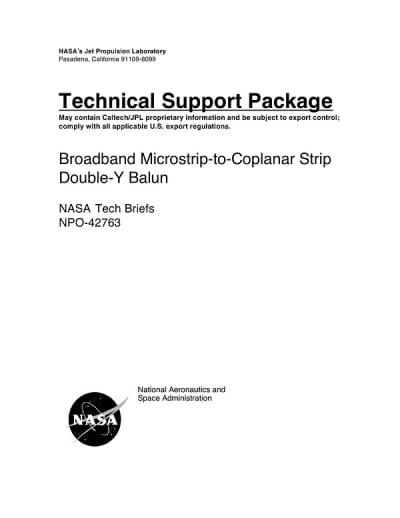A new version of the double-Y balun, transitioning from an unbalanced microstrip to a balanced coplanar strip (CPS) line, has been designed to feed a complementary spiral antenna with an input impedance of 100 Ω. Various versions of the double-Y balun have been investigated in previous literature for use with balanced mixers and pulsed antennas. Of the previous versions, the double-Y balun transitioning from a coplanar waveguide (CPW) to CPS was found to exhibit the widest bandwidth of operation while having little metal content (attractive for use in ground-penetrating radar applications). However, the double-Y balun transitioning from a CPW to CPS requires coplanar waveguide bridges at the junction; the inductive behavior of the bridges, in addition to CPW parasitic resonances, degrades the passband performance of the balun.

The new double-Y balun transitions from a microstrip line with truncated ground plane to a CPS line. The balun does not employ CPW lines; hence, CPW bridges are not required at the junction. In addition, the balun does not exhibit CPW parasitic resonances, thereby improving passband performance.

Figure 1 illustrates the new version of the double-Y balun designed to feed a complementary spiral antenna. Panels on the right illustrate an expanded view of the balun junction. Preliminary voltage standing-wave ratio (VSWR) and insertion loss data are illustrated in Figure 2. Measured data were compared with numerical results computed using Momentum. It is seen that the balun exhibits a VSWR of less than 1.5 from 400 MHz to 8 GHz and a VSWR of less than 1.8 up to 13 GHz. The VSWR can be reduced further by reducing reflections from the balun junction and load resistor. Also, the balun is seen to exhibit an insertion loss of less than 1.5 dB up to 12 GHz. Further work involves characterizing the balun’s performance when feeding a complementary spiral antenna.
This work was done by Jaikrishna Venkatesan of Caltech for NASA’s Jet Propulsion Laboratory.
NPO-42763
This Brief includes a Technical Support Package (TSP).

Broadband Microstrip-to-Coplanar Strip Double-Y Balun
(reference NPO-42763) is currently available for download from the TSP library.
Don't have an account?
Overview
The document discusses the design and development of a novel broadband balun, specifically a double-Y junction that transitions from an unbalanced microstrip line to a balanced coplanar strip (CPS) line. This innovation is significant as it represents the first instance of such a transition in the context of double-Y baluns, which have been previously studied for applications in balanced mixers and pulsed antennas.
The advantages of this new design include low metal content, ease of fabrication, and enhanced broadband performance. By utilizing microstrip lines instead of coplanar waveguide (CPW) lines, the design effectively avoids parasitic resonances that can negatively impact performance, thus improving the overall functionality of the balun.
The document references several studies and papers that have explored various versions of the double-Y balun, highlighting the evolution of this technology. Notable references include works by V. Trifunovic and B. Jokanovic, who have contributed significantly to the understanding of printed Marchand and double-Y baluns, as well as investigations into their applications in microwave integrated circuits (MMICs) and wireless technologies.
The motivation behind this development is linked to the need for improved microwave components, which will be further elaborated in subsequent documents discussing related technologies, such as an asymmetric coplanar waveguide to coplanar strip transition. This indicates a broader research effort aimed at enhancing microwave technology for various applications.
The document is part of NASA's Technical Support Package, which aims to disseminate aerospace-related developments that have potential commercial, scientific, or technological applications. It emphasizes the importance of compliance with U.S. export regulations and the proprietary nature of the information contained within.
Overall, the document serves as a technical overview of the novel broadband balun, detailing its design, advantages, and the context of its development within the field of microwave technology. It underscores NASA's commitment to innovation and the sharing of technological advancements that can benefit a wider audience beyond aerospace applications.

